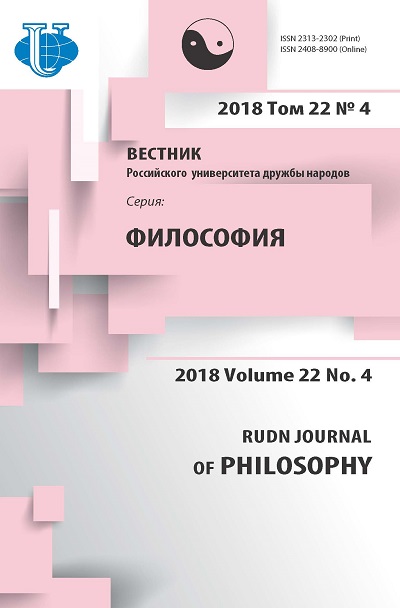‘DIALOGUES ON HINDU PHILOSOPHY’ BY KRISHNAMOHUN BANERJEA: HISTORY OF THOUGHT IN THE INTERPRETATION OF INDIAN CHRISTIAN
- Authors: Skorokhodova TG1
-
Affiliations:
- Penza State University
- Issue: Vol 22, No 4 (2018)
- Pages: 455-467
- Section: HISTORY OF PHILOSOPHY
- URL: https://journals.rudn.ru/philosophy/article/view/20488
- DOI: https://doi.org/10.22363/2313-2302-2018-22-4-455-467
- ID: 20488
Cite item
Full Text
Abstract
The first Modern attempt to research a history of Indian philosophy by Indian scholar, theologian and social activist Krishnamohun Banerjea (1813-1885) is considered in the article. The purpose of the article is to show how in ‘Dialogues on the Hindu Philosophy’ is solved the problem of a choice of the basis for understanding by Indian intellectuals their own classical philosophy. Methodology of the article’s author is phenomenological approach which makes clear intentions and motives of the scientist and hermeneutical analysis of ‘Dialogues’. As a result, methodology of historical-philosophical research used in the book is exposed: viz. principle of historicism, analysis of philosophical schools’ Sanskrit sources, intercultural and interschool comparison, analysis of basic categories’ origin. The content of dialogue is described, including Hinduism’s content, a history of genesis of Brahminical schools and analysis of basic categories and ideas of Nyaya, Sankhya and Vedanta. Creating the image of Indian classical philosophy as indigenous thought on a being and thinking, K. Banerjea had resolved methodological problem of Indians’ approach to their own philosophical traditions - as objective, non-attached to any school and based on strict analysis of sources.
About the authors
T G Skorokhodova
Penza State University
Author for correspondence.
Email: skorokhod71@mail.ru
доктор философских наук, кандидат исторических наук, доцент, профессор кафедры «Теория и практика социальной работы» ФГБОУ ВО «Пензенский государственный университет»
Krasnaya str., 40, Penza, Russia, 440026References
- Burmistrov S.L. Dvizhuschie sily istoriko-filosofskogo processa v filosofii neovedantizma. Voprosy filosofii. 2008. № 12. S. 153—162.
- Kostyuchenko V.S. Klassicheskaya vedanta i neovedantizm. М.: Mysl, 1983.
- Mukerji Bithika, Neo-Vedanta and Modernity. Varanasi, Ashutosh Prakashan Sansthan, 1983.
- Chottopaddhay Bonkimchondro. Issledovanie indusskoy filosofii. Per. s angl. Voprosy filosofii. 2016;11:167—174.
- Roy Raja Rammohun. The English Works. Ed. by J.C. Ghose. In 4 vols. New Delhi: Cosmo, 1982. Vol. I.
- Halbfass W. India and Europe. An Essay of Philosophical Understanding. Albany: SUNY Press, 1988.
- Pskhu R.V., Kryshtop L.E. Istoriya indiyskoy filosofii v srednevekovoy Indii I nachalo retceptsii indiyskoy filosofii v evropeyskom intellektualnom prostranstve. Voprosy filosofii. 2017;5: 148—160.
- Skorokhodova T.G. Mladobengaltsy. Ocherki istorii socialnoy mysli Bengalskogo Vozrozhdeniya. (Pervyi period, 1815—1857). SPb.: Peterburgskoye Vostokovedeniye, 2012.
- Krishna Mohan Banerjea: Christian Apologist. Ed. with Introd. by T.V. Philip. Bangalore: CISRS, 1982.
- Muir J. Original Sanskrit Texts on the Origin and History of the People of India, Their Religion and Institutions, Collected, Translated and Illustrated. In V vols. L.: Trübner & Co, 1860—1870.
- Banerjea Krishna Mohun. Dialogues on the Hindu Philosophy. L.—Edinburgh: Williams & Norgate, 1861.
- Awakening in Bengal in the Early Nineteenth Century. Selected Documents. Ed. by G. Chattopadhyaya. Calcutta: Progressive Publishers, 1965.
Supplementary files















